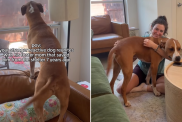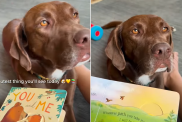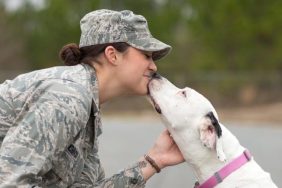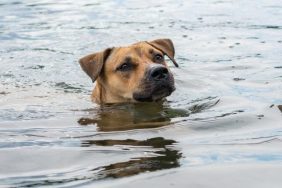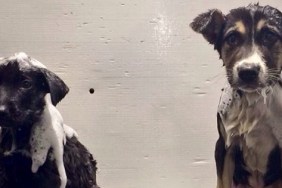In early February, DogTime.com broke the news about the mass stray dog executions happening in Sochi, Russia just ahead of the 2014 Olympic Games.
Then, after a public outcry from animal advocates all across the globe, rescuers made a mad dash around the city, bringing as many homeless animals to safety as possible before the opening ceremonies. A makeshift animal shelter funded by Russian billionaire oligarch Oleg A. Deripaska sprung up on the outskirts of Sochi, a refuge from the teams of exterminators making their rounds inside city limits.
Nadezhda Maiboroda, who runs that shelter, called PovoDog, says stray animals flooded the area when the 100,000-man construction crew came to town to build the Olympic sites. These workers left food out for the dogs, paid them attention, but then left the animals behind after the job was done.
“All Olympic projects are finished. Builders have gone home. But the dogs [are] still there,” Maiboroda tells VOA News.
But PovoDog is already starting to make a huge impact, thanks in part to Internet outreach, especially PovoDog’s Facebook page, which is gaining in popularity by the day.
Humane Society International (HSI) is also getting the word out about how people living outside of Russia can go about adopting one of Sochi’s rescued street dogs.
HSI is advising American and other tourists interested in adding a Sochi dog to the family to fully research all required paperwork, vaccinations, and quarantine requirements before making transportation arrangements. Foreign visitors to Russia are advised to contact their country’s embassies to find out more about pet transport requirements, and to visit a licensed veterinarian with their new pet for a full health exam and all necessary health certificates. Finally, new adopters are asked to plan ahead by checking with their airline regarding all pet transportation guidelines and costs, which can range from $150 to $2,000 USD or more per animal.
“I think it’s a situation where everyone’s hearing about the very sad and terrible means of killing these dogs and people are feeling a bit helpless in what they can go,” HIS International Director for Companion Animals and Engagement Kelly O’Meara tells KSDK.com. “This is a life-or-death situation for many of them that are being seen in and around Sochi, and that’s why people are sort of jumping in and asking how they can help.”
Olympic tourists are already lining up in droves, hoping for the chance to adopt a Sochi dog. But making headlines today are the many Olympic athletes who will be bringing more than just medals back home with them.
American slopestyle skiing silver medalist Gus Kenworthy famously postponed his trip back to the U.S. while travel arrangements can be made to fly a group of Sochi pups — and their mother — home with him. Photos of Kenworthy snuggling with his new fluffy friends made quite a splash as soon as Kenworthy posted them on his Twitter feed. Even pop star and dog lover Miley Cyrus took notice.
Another Sochi stray has found a home with an Olympic athlete. While U.S. Olympic snowboarder Lindsey Jacobellis didn’t claim a medal in Sochi, she isn’t going home empty-handed. Jacobellis posted an Instagram photo with her new best friend February 15. She is set to fly home with pup in hand sometime today.
U.S. bobsled and skeleton athlete Amanda Bird, who already owns an Australian Shepherd named Sammy, tells AZCentral.com she also plans to adopt a Sochi dog, preferably an older one.
“I plan on going to the shelter and bringing one of my co-workers with me because I’m sure it’s going to be really difficult to walk in and see 100 dogs and be, like, which one?” Bird says.
And finally, the U.S. Men’s Hockey team is feeling Sochi puppy love, too. Goalie Ryan Miller tweeted a photo of a small white and brown dog curled up in front of a Sochi hotel.
“Family hotel mascot!” Miller tweets. “Couple stray dogs have been cleaned up and adopted by players.”
U.S. Hockey forward David Backes, who founded the nonprofit Athletes for Animals with his wife, Kelly, tells the Wall Street Journal that players from the U.S., Canada, and Slovenia are all planning to bring Sochi dogs home with them, whether to adopt them or find good homes for them outside of Russia. Backes says while he and the other hockey players are busy vying for the gold, their families are busy looking into travel arrangements for the rescued dogs.
“It’s not a short flight,” Backes explains. “To have them under the belly of the plane for a long time, we want to make sure that all makes sense, too, and that we’re not putting them in any harm. There are things we need to check off that list before we go ahead with it.”
Backes says the vast majority of the stray animals he’s come across in Sochi have been nothing like what he’d read in reports before arriving in the Olympic city.
“They kind of were portrayed a little bit as rabid animals that were dangerous,” Backes says. “I don’t know if anyone’s seen that out of those animals. I think you’ve seen a lot of friendly, smart street dogs that have perhaps have had a tough life and had to find ways to get food and shelter and water and all that good stuff.”
Are you interested in adopting a Sochi dog from PovoDog or other Russian animal rescue organizations? Check out HIS.org for more information.
Sources: VOA News, PovoDog on Facebook, HIS.org, KSDK.com, AZCentral.com, Wall Street Journal



